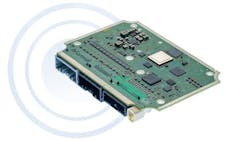ECU Brings Cutting-Edge Vehicle Connectivity to SDVs
With the automotive industry transitioning toward a software-defined vehicle (SDV) future, creating reliable communication networks inside and outside the vehicle is becoming increasingly important. Many of the solutions being developed center on a flexible backbone of Ethernet, controller area network (CAN), and local interconnect network (LIN) buses. Moreover, stringent regulatory requirements such as ISO 26262 safety compliance and the recent UN R155 and ISO 21434 cybersecurity regulations add further challenges to the design process for automotive engineers.
In response, NXP Semiconductors and TTTech Auto have forged a strategic collaboration, pooling their collective strengths to improve in-vehicle networking and unlock the full potential of automotive connectivity. Their customers were interested in series-ready electronic control units (ECUs) built around the latest chipset technologies.
TTTech Auto's partnership with NXP aims to harness the synergies between their expertise. The focus is on enhancing security features and ensuring seamless integration across different domains for in-vehicle secure gateways or high-performance computing platforms for connected services.
New Network Controller is SDV-Facing
The resulting N4 Network Controller is an ECU with advanced networking capabilities (8x Ethernet, 12x CAN (FD) and 2x LIN). Designed to play a central role in modern automotive architectures, this product is said to pave the way for SDVs.
Equipped with the NXP S32G network processor, the N4 is well-suited to act as a central and secure gateway, with the option to integrate additional vehicle control and connectivity applications. It acts as a central gateway control unit, routing between multiple CAN and Ethernet networks. A dedicated Ethernet TSN switch enables low-latency network communication.
Robust Functional-Safety and Cybersecurity Features
According to the company, the N4 provides all of the necessary conditions to ensure cybersecurity according to ISO 21434 and can implement safety functions up to ASIL B according to ISO 26262.
Combined with the S32G2 processor, it enables functional-safety and cybersecurity features, preparing the ground for carmakers to implement over-the-air updates and subscription-based business models while ensuring the in-vehicle architecture remains protected from cyberattacks.
TTTech’s N4 Network Controller offers carmakers an ECU suited for modern architectures and SDVs with advanced networking capabilities. According to the company, it chose to partner with NXP because of its components tailored to the automotive industry's rigorous demands, a richly supported tools and software ecosystem, and a Product Longevity program whose goal is to ensure a stable supply of products.
Participating products in this program are available for a minimum of 10 years. Designated participating products developed for the automotive, telecom, and medical segments are available for a minimum of 15 years.
Seamless Integration with NXP Components
NXP's solutions, including the NXP S32G2 processor for vehicle networking, the NXP SJA1110 multi-gig TSN Ethernet switch with integrated 100BASE-T1 PHYs, and the NXP VR5510 multichannel PMIC, enable seamless integration.
The S32G2 supports the needs of new vehicle architectures: service-oriented gateways, domain controllers, zonal processors, safety processors, and more. Its vehicle network processors are supported by a broad range of software enablement that consists of Reference Software, Standard Software, and Premium Software, in addition to support from the S32 Design Studio IDE.
The NXP SJA1110 is a family of four pin- and software-compatible automotive Ethernet Switch SoCs offering a scalable solution for automotive applications. All SJA1110 variants come with hardware-assisted security and safety capabilities and multi-gigabit SGMII interfaces, and they meet the latest AVB and TSN standards.
The VR5510 is NXP’s multichannel high-voltage PMIC device designed to be used for high-performance automotive and industrial applications. It’s designed specifically for the S32G vehicle network processor family targeting service-oriented gateways, domain controllers, and safety controller applications.
Integrated and independent voltage-monitoring circuits ensure compliance with the ISO 26262 standard and functional safety up to ASIL D level. The VR5510 is also available as a standard ASIL B device or a non-safety device for applications that have different ISO compliance requirements.
TTTech Auto's N4 Network Controller brings these components together into a secure gateway and computing platform for connected services. The N4 Network Controller ensures inside and outside vehicle connectivity, while the S32G2 brings safety, cybersecurity, performance and high network capability. The SJA1110 switch provides the bandwidth for Ethernet communication and the VR5510 PMIC dispenses the power supply.
The solution is flexible enough to run an RTOS (e.g., AUTOSAR) alongside a POSIX (e.g., Linux) or just one of them. This feature enables the reuse of existing code or allows developers to run different software stacks (such as those based on BlackBerry QNX). The S32G2's Low Latency Communication Engine (LLCE) firmware acceleration feature also helps direct gateway routing.

